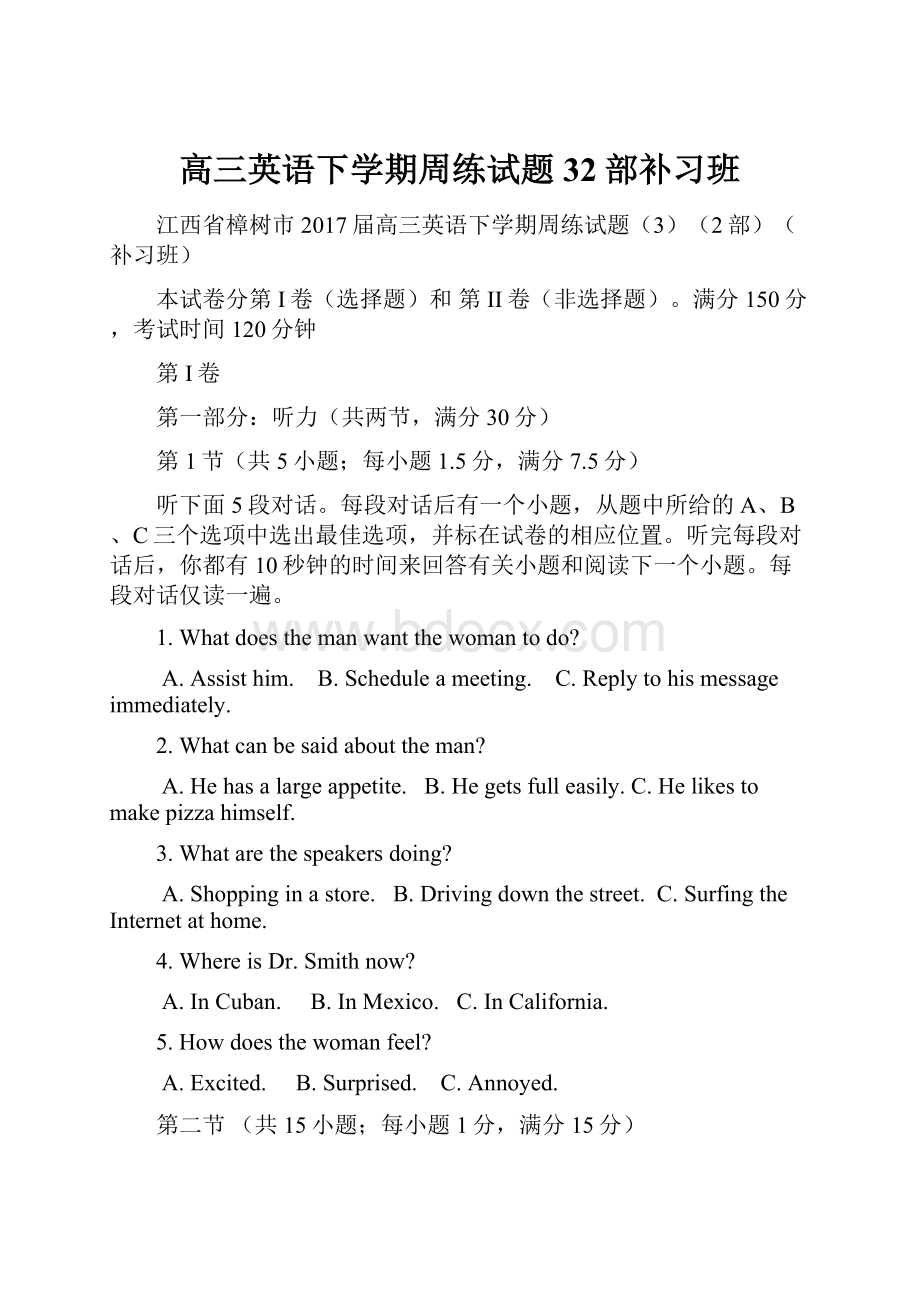高三英语下学期周练试题32部补习班.docx
《高三英语下学期周练试题32部补习班.docx》由会员分享,可在线阅读,更多相关《高三英语下学期周练试题32部补习班.docx(18页珍藏版)》请在冰豆网上搜索。

高三英语下学期周练试题32部补习班
江西省樟树市2017届高三英语下学期周练试题(3)(2部)(补习班)
本试卷分第I卷(选择题)和第II卷(非选择题)。
满分150分,考试时间120分钟
第I卷
第一部分:
听力(共两节,满分30分)
第1节(共5小题;每小题1.5分,满分7.5分)
听下面5段对话。
每段对话后有一个小题,从题中所给的A、B、C三个选项中选出最佳选项,并标在试卷的相应位置。
听完每段对话后,你都有10秒钟的时间来回答有关小题和阅读下一个小题。
每段对话仅读一遍。
1.Whatdoesthemanwantthewomantodo?
A.Assisthim.B.Scheduleameeting.C.Replytohismessageimmediately.
2.Whatcanbesaidabouttheman?
A.Hehasalargeappetite.B.Hegetsfulleasily.C.Helikestomakepizzahimself.
3.Whatarethespeakersdoing?
A.Shoppinginastore.B.Drivingdownthestreet.C.SurfingtheInternetathome.
4.WhereisDr.Smithnow?
A.InCuban.B.InMexico.C.InCalifornia.
5.Howdoesthewomanfeel?
A.Excited.B.Surprised.C.Annoyed.
第二节 (共15小题;每小题1分,满分15分)
听下面5段对话或独白。
每段对话或独白后有几个小题,从题中所给的A、B、C三个选项中选出最佳选项,并标在试卷的相应位置。
听每段对话或独白前,你将有时间阅读各个小题,每小题5秒钟;听完后,各小题将给出5秒钟的作答时间。
每段对话或独白读两遍。
听第6段材料,回答第6至7题。
6.Wheredidthemangethisshirt?
A.AtGap.B.AtAmericanEagle.C.AtMacy’s.
7.Whydoesthewomanwanttogoshoppingwiththeman?
A.Sheneedsprofessionalclothing.B.Hecanhelpherdressbetter.
C.Shewantshelpfindingitemsonsale.
听第7段材料,回答第8至9题。
8.Whycan’tthemangetadiscount?
A.Ticketsaresoldout.B.Itisn’tavailableforLondon.C.Hecan’ttravelearlyintheweek.
9.Whatwillthemandonext?
A.SurftheInternet.B.Cancelhistrip.C.Putoffthemeeting.
听第8段材料,回答第10至12题。
10.Whatwillthegirldotonight?
A.Eatdinnerwithsomefriends.B.Drivetothemovies.C.GotoTrisha’shouse.
11.Howdoesthegirlfeelaboutherfather’srules?
A.They’resimple.B.They’redifficulttofollow.C.They’reunnecessary.
12.Whatdoesthegirl’sfathertellher?
A.Sheneedstobehomeby11:
00p.m.B.Thingswillchangewhenshe’sanadult.
C.Hedoesn’tcareaboutherfriend.
听第9段材料,回答第13至16题。
13.Howdopeopleusuallymakeanappointmentintheshop?
A.Overthephone.B.Online.C.Inperson.
14.Whatiswrongwiththewoman’scomputer?
A.Shecan’thavetoomanywindowsopen.B.Thescreenturnsoffbyitself.
C.Thepowerbuttondoesn’twork.
15.Howmuchwillthewomanpay?
A.$35perhour.B.$70perhour.C.$105perhour.
16.Whatshouldthewomandobeforeshesignstheform?
A.Paysomemoneyinadvance.
B.Readthestatementatthebottom.
C.Runsometestsonhercomputer.
听第10段材料,回答第17至20题。
17.WhichfilmmadeEzraMillerfamous?
A.Trainwreck.B.WeNeedtoTalkaboutKevin.C.Afterscool.
18.AtwhatagedidEzraMillerstartsingingopera?
A.Aroundelevenyearsold.B.Nineyearsold.C.Sixyearsold.
19.Besidesacting,whatdoesEzraMillerdo?
A.Heplaysthedrums.B.Hewritesbooks.C.Heisadancer.
20.WhydidEzraMillergototheArctic?
A.Totravel.B.Toprotestagainstdrillingforoil.C.Tospeakabouthumanrights.
第二部分:
阅读理解(共两节,满分40分)
第一节(共15小题;每小题2分,满分30)
阅读下面短文,从A、B、C、D四个选项中,选出可以填入空白处的最佳选项,并在答题卡上将该项标号涂黑。
A
ZeroWasteAwards
Whoshouldenter?
Entries(参赛作品)arewelcomedfromanyonewhoprocesseswaste.WhileweexpectmostentriestocomefromtheUK,wewelcomeinternationalentries,too.Entrantshavebeensplitintothefollowinggroups:
privatesector,publicsector,communitysectorandpartnerships.
Whatarethecategories?
There’refivecategorieswhicharebasedontheWasteHierarchy(层级).WeappreciatethatcompanieswillhavedifferentstrengthswithinthosecategoriesastheyworktowardsZeroWaste.Thebroadcategoriesare:
wasteprevention,re-use,recycle/recover,energyrecovery,general.
HowdoIenter?
Submittinganentryisreallyeasy!
Justfollowthesefewsimplesteps:
1.Carefullyreadthroughthecategoryinformation;
2.Writeyourentry--itshouldbeamaximumof1,500wordsandaworddocument;
3.Arrangeyoursupportingmaterialintoasingledocument--maximumsixpageslong;
4.Completethesimpleonlineentryform.
Importantdates
Whileentriesarewelcomedallyearround,thesearekeydates—thisistogivethejudgesplentyoftimetoreadthroughalltheentries!
Thesearelistedinentrydeadlinescolumnbelow.Don’tworryifyouhavejustmissedoneoftheentrydeadlines,yoursubmissionwillbeautomaticallyenteredintothenextsession.
Entrydeadlines
Judgingdates
Awardspresentationdates
1stMarch
12thMarch
4thApril
1stJune
12thJune
4thJuly
1stSept.
12thSept.
4thOct.
1stDec.
12thDec.
4thJan.
*Youcansubmitamaximumoftwoentriesperyear—sixmonthsapart.
Awards
WeunderstandthatworkingtowardsZeroWasteisanongoingjourneyandassuchtheZeroWasteAwardsschemeoffersorganizationsastructuretocelebratetheirprogressalongtheway.Thefourawardsare:
Gold(76-100),Silver(51-75),Bronze(26-50),HighlyCommended(0-25).
21.Whatshouldyouknowaboutyourentrywhenyousubmit?
A.Itshouldbeatleast1,500words.
B.Itmustgowithfillinginanonlineentryform.
C.Ithadbetternotbeshorterthansixpages.
D.Itcanbehandedinshortlyafteryourprevioussubmission.
22.IfyousubmitanentryonMarch4th,itwillbejudgedon_______.
A.March12thB.April4thC.June12thD.June1st
23.Whatistheauthor’spurposeofwritingthetext?
A.ToreportthedevelopmentofZeroWaste.
B.TointroduceZeroWasteAwardsindetail.
C.Toadvocatepeopletojoinintherecyclingmovement.
D.TotellpeopleworkingatZeroWasteisreallydifficult.
B
Badnewssells.Ifitbleeds,itleads.Nonewsisgoodnews,andgoodnewsisnonews.Thosearetheclassicrulesfortheeveningbroadcastsandthemorningpapers.Butnowthatinformationisbeingspreadandmonitoredindifferentways,researchersarediscoveringnewrules.Bytrackingpeople'se-mailsandonlineposts,scientistshavefoundthatgoodnewscanspreadfasterandfartherthandisastersandsobstories.
"The'ifitbleeds'ruleworksformassmedia,"saysJonahBerger,ascholarattheUniversityofPennsylvania."Theywantyoureyeballsanddon'tcarehowyou'refeeling.Butwhenyoushareastorywithyourfriends,youcarealotmorehowtheyreact.Youdon'twantthemtothinkofyouasaDebbieDowner."
Researchersanalyzingword-of-mouthcommunication—e-mails,Webpostsandreviews,face-to-faceconversations—foundthatittendedtobemorepositivethannegative,butthatdidn'tnecessarilymeanpeoplepreferredpositivenews.Waspositivenewssharedmoreoftensimplybecausepeopleexperiencedmoregoodthingsthanbadthings?
Totestforthatpossibility,Dr.Bergerlookedathowpeoplespreadaparticularsetofnewsstories:
thousandsofarticlesonTheNewYorkTimes'website.HeandaPenncolleagueanalyzedthe"moste-mailed"listforsixmonths.Oneofhisfirstfindingswasthatarticlesinthesciencesectionweremuchmorelikelytomakethelistthannon-sciencearticles.HefoundthatscienceamazedTimes'readersandmadethemwanttosharethispositivefeelingwithothers.
Readersalsotendedtosharearticlesthatwereexcitingorfunny,orthatinspirednegativefeelingslikeangeroranxiety,butnotarticlesthatleftthemmerelysad.Theyneededtobearousedonewayortheother,andtheypreferredgoodnewstobad.Themorepositiveanarticle,themorelikelyitwastobeshared,asDr.Bergerexplainsinhisnewbook,"Contagious:
WhyThingsCatchOn."
24.Whatdotheclassicrulesmentionedinthetextapplyto?
A.Newsreports. B.Researchpapers.C.Privatee-mails. D.Dailyconversations.
25.WhatcanweinferaboutpeoplelikeDebbieDowner?
A.They'resociallyinactive. B.They'regoodattellingstories.
C.The'reinconsiderateofothers. D.They'recarefulwiththeirwords.
26.Whichtendedtobethemoste-mailedaccordingtoDr.Berger'sresearch?
A.Sportsnew. B.Sciencearticles.C.Personalaccounts. D.Financialreviews.
27.Whatcanbeasuitabletitleforthetext?
A.SadStoriesTravelFarandWide. B.OnlineNewsAttractsMorePeople.
C.ReadingHabitsChangewiththeTimes.D.GoodNewsBeatsBadonSocialNetworks.
C
Thesharingeconomy,representedbycompanieslikeAirbnborUber,isthelatestfashioncraze.Butmanysupportershaveoverlookedtherealitythatthisnewbusinessmodelislargelybasedonescapingregulationsandbreakingthelaw.
AirbnbisanInternet-basedservicethatallowspeopletorentoutspareroomstostrangersforshortstays.UberisanInternettaxiservicethatallowsthousandsofpeopletoanswerriderequestswiththeirowncars.Therearehundredsofothersuchservices.
Thegoodthingaboutthesharingeconomyisthatitpromotestheuseofunderusedresources.Millionsofpeoplehavehousesorapartmentswithemptyrooms,andAirbnballowsthemtoprofitfromtheseroomswhileallowingguestsaplacetostayatpricesthatareoftenfarlessthanthosechargedbyhotels.Uberofferspricesthatarecompetitivewithstandardtaxipricesandtheirdriversareoftenmuchquickerandmoretrustworthy.
Butthedownsideofthesharingeconomyhasgottenmuchlessattention.Mostcitiesandstatesbothtaxandregulatehotels,andthetouristswhostayinhotelsareusuallyanimportantsourceoftaxincome.ButmanyofAirbnb'scustomersarenotpayingthetaxesrequiredunderthelaw.
Airbnbcanalsoraiseissuesofsafetyforitscustomersandtroubleforhosts'neighbors.Hotelsareregularlyinspectedtoensurethattheyarenotfiretrapsandthat theydon'tformotherrisksforvisitors.Airbnbhostsfacenosuchinspections.
SinceAirbnbisallowingpeopletoescapetaxesandregulations,thecompanyissimplypromotingthefts.Othersintheeconomywilllosebybearinganadditionaltaxburdenorbeingforcedt